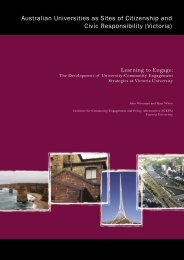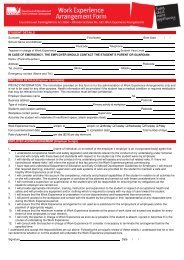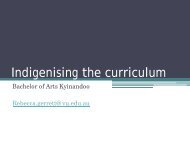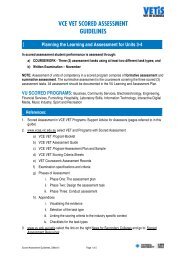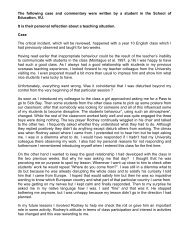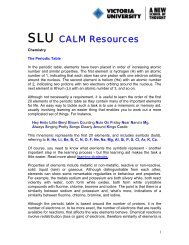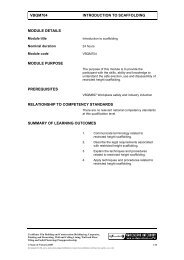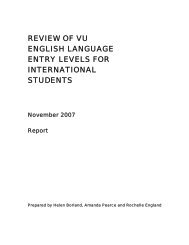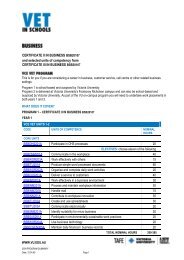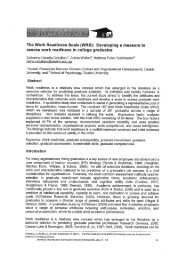Issue 6 2010 - TLS - Victoria University
Issue 6 2010 - TLS - Victoria University
Issue 6 2010 - TLS - Victoria University
Create successful ePaper yourself
Turn your PDF publications into a flip-book with our unique Google optimized e-Paper software.
Last writes<br />
by Anson Cameron<br />
In this age where we tweet, text, email and blog,<br />
communicating more but saying less, Anson<br />
Cameron laments the loss of the letter.<br />
I HAVE a letter from my father, written after he was<br />
diagnosed with terminal cancer, that begins:<br />
My Dear A.J.<br />
The age of letter writing is of course gone but I have<br />
always been better able to express myself in writing,<br />
especially where emotions are involved. I wanted to<br />
write to you at this time to say a few things while I<br />
have reasonable clarity of mind...<br />
Five pages later the letter ends:<br />
My uttermost blessings and wishes for your lifetime<br />
health and happiness and that of Sarah, Asta and<br />
Freya.<br />
Love Graeme. (Dad)<br />
P.S. NO reply of course!<br />
In my reply (of course) on a page headed<br />
SENTIMENTALITY, I offered my own fond<br />
memories and love. Then on another page titled<br />
BUSINESS I offered to help him end his merciless<br />
decline with a bottle of scotch and a conversation and<br />
some carbon monoxide and a view of the Strathbogie<br />
Ranges.<br />
He then wrote me another letter, which began:<br />
My heart bled and my eyes welled when I read your<br />
wonderful, gallant offer to stand by my side at the<br />
edge of eternity.<br />
There was nothing wonderful or gallant about it; it<br />
was one possible next step in a friendship. But this<br />
was the opening sentence of a letter in which he took<br />
two pages to knock me back.<br />
No father and son were better friends, I think, but if<br />
we hadn’t said these things in letters they would have<br />
remained unsaid. For we are not European or Middle<br />
Eastern men. We are Anglo-Celts and we have no<br />
easy recourse to emotion. We cannot weep or wail<br />
in each other’s presence. We cannot hug or make<br />
spoken declarations of love. We had two powerful<br />
communications. We could shake hands while<br />
looking into each other’s eyes and therein see and<br />
swap a story. Or we could write letters.<br />
But Graeme (Dad) was right; the age of letter<br />
writing is gone. And I reveal these extracts from his<br />
letters only to give an idea of the profundity, love<br />
and honesty hand-written correspondence so easily<br />
contains. A letter seems to me a magical vessel, one of<br />
the few that can hold all that is in a person’s heart.<br />
There is the expectation that your letter will be read<br />
and re-read by its recipient at leisure, in isolation.<br />
It will be studied, its every nuance and mood<br />
explored. It is, after all, a considered, composed<br />
communication.<br />
Would I have said the things I said to my father in an<br />
email Could I have said them in the 140 characters<br />
of a Tweet Could we have had this conversation on<br />
Facebook<br />
Computers and phones are rightly regarded as<br />
porous devices and anything we say on them must<br />
be understood to be said in a semi-public domain.<br />
What chance true honesty if you suspect you might<br />
be pouring your heart into the Town Crier’s ear<br />
What chance a declaration of love And what fool<br />
would offer assistance to a friend to end their curdled<br />
mortality over the internet People writing computerto-computer<br />
know what they are saying is potentially<br />
public and are wary of revealing too much.<br />
Historians have routinely mined the letters of the<br />
famous dead to flesh out their humanity. The letters<br />
were not always an accurate guide to the man, of<br />
course. Famous people are at least as duplicitous as<br />
the hoi polloi and many (especially writers) had an<br />
eye to posterity when writing their letters and were<br />
therefore writing for history, enhancing their legend.<br />
Even this was no bad thing for the historian. If<br />
one was painstaking over one’s letters because one<br />
expected them to be kept, then good, the writer<br />
was in effect penning for us the outline of an<br />
autobiography. At their best a collection of letters<br />
could give a picture of a private life, and an X-ray of<br />
an inner life.<br />
CHARLES Darwin was a shy, non-combative, tense<br />
and often ill man who lived a double life. He sat on<br />
his theory of natural selection for seven years before<br />
he wrote to botanist Joseph Hooker in 1844. “I am<br />
almost convinced (quite contrary to the opinion I<br />
started with) that species are not (it is like confessing<br />
a murder) immutable”.<br />
His class and family hated the “fierce and licentious”<br />
radical hooligans who would tear down the social<br />
order without God to stop them, he worried. And<br />
he didn’t want trouble with the church, his scientific<br />
friends . . . or his wife, who was deeply religious.<br />
It was a full 20 years after its inception that Darwin<br />
finally bared his theory. Luckily we have his<br />
notebooks and 14,000 letters to and from him in<br />
which he made and broke friendships, equivocated,<br />
courted supporters and extracted knowledge from<br />
others.<br />
Page 57



